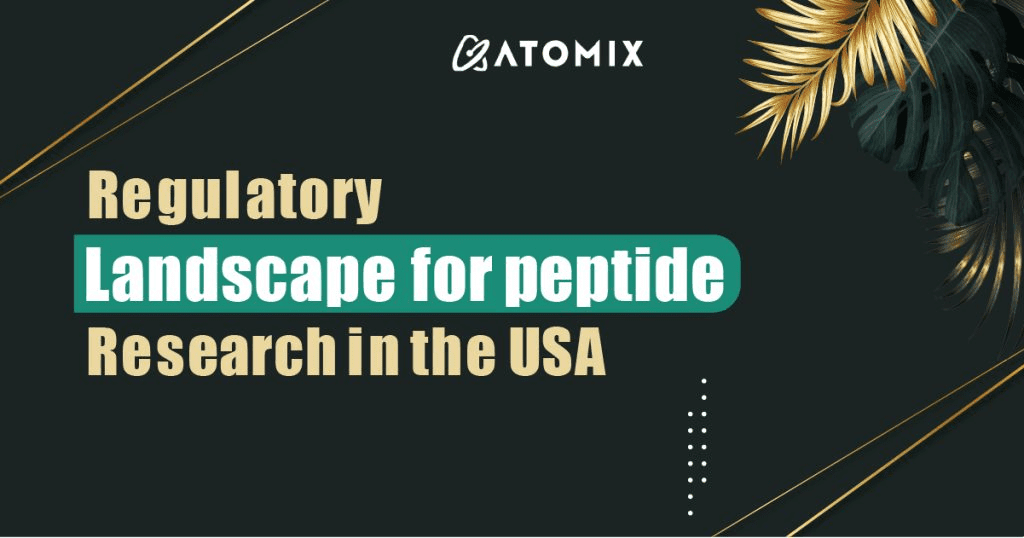Regulatory Landscape for Peptide Research in the USA

Peptide research is one of the most rapidly expanding fields in biomedical science. From drug discovery to biochemical studies, peptides are at the center of innovation in modern laboratories. But with such rapid growth comes another critical factor: regulation.
In the United States, researchers working with peptides must navigate a complex but necessary set of rules that protect public safety and ensure scientific integrity.
This article examines the regulations governing peptide research in the USA, their significance, and the impact on laboratories, universities, and commercial enterprises.
Why Regulations Are Important in Peptide Research
Peptides may seem like small molecular chains, but their potential is enormous. They can act like hormones, regulate signaling pathways, and even serve as therapeutic candidates. Because of their powerful biological effects, peptide research must be closely monitored.
Regulations:
- Protect humans and animals from harm
- Prevent misuse or abuse
- Ensure that scientific outcomes are accurate and reproducible
Without a clear regulatory framework, research could slip into unsafe practices, legal violations, or credibility issues. For researchers and companies, understanding and following these rules is not only about compliance, but it is also the foundation for building trust and achieving long-term success.
Research Use Only (RUO) vs. Therapeutic Use
In the United States, there is a critical distinction between Research Use Only (RUO) peptides and peptides intended for therapeutic or clinical use.
- RUO peptides: These are strictly for laboratory experiments, academic research, or preclinical trials. They cannot be marketed, branded, or promoted for the diagnosis, treatment, or prevention of human disease. Companies like Atomix Research clearly emphasize this boundary by offering peptides exclusively for research purposes.
- Therapeutic peptides: Once a peptide is intended for human use as a drug candidate or medical diagnostic, it falls under the jurisdiction of the S. Food and Drug Administration (FDA). This pathway involves preclinical testing, filing an Investigational New Drug (IND) application, and completing clinical trials before approval.
Understanding this distinction is essential. Even a minor misrepresentation, such as claiming that RUO peptides are “safe for human consumption,” can result in serious regulatory action.
The Role of the FDA
The FDA is the primary authority regulating peptides beyond basic research and development. Its responsibilities include:
- Drug evaluation: Any peptide intended for therapeutic use must be FDA-approved, requiring proof of safety, efficacy, and quality.
- Good Manufacturing Practices (GMP): Facilities producing peptides for therapeutic or clinical use must adhere to GMP standards to ensure purity, consistency, and safety.
- Labeling requirements: Products must be labeled accurately to prevent false or misleading claims.
This means that while researchers may freely purchase RUO peptides for laboratory use, moving toward clinical applications requires strict compliance with FDA regulations.
Institutional Oversight: Universities and Laboratories
In addition to federal oversight, many institutions impose their own regulations. Institutional Review Boards (IRBs) or Ethics Committees review research protocols involving humans or animals. Laboratories must also follow Biosafety Level (BSL) standards based on the peptide’s type, origin, and intended use.
This combination of federal and institutional oversight ensures that research adheres to ethical guidelines while minimizing risks.
Import and Export Regulations
Peptide research often involves global collaboration, which makes international trade another regulatory factor. Import and export are monitored by U.S. Customs and Border Protection (CBP) and related agencies.
Specific peptides, particularly those classified as controlled substances or banned in sports, are restricted. For example, the World Anti-Doping Agency (WADA) maintains a list of peptides prohibited in athletics. While these may be legal for laboratory use, importing or distributing them for performance enhancement can result in penalties.
Common Compliance Challenges
Even with clear guidelines, researchers and businesses often face compliance hurdles such as:
- Ambiguity in labeling: Some vendors blur the line between RUO and therapeutic claims.
- Storage and stability issues: Improper storage can lead to compliance violations during inspections.
- Poor documentation, including a lack of records on sourcing, batch purity, and usage, complicates regulatory audits.
The best defense is a proactive approach: invest in compliance training, maintain detailed documentation, and source peptides only from reputable suppliers.
The Future of Peptide Regulation
As peptide research grows, regulations will continue to evolve. The FDA has already indicated its intent to update guidelines for biologics and peptides. Future developments may include:
- Clearer pathways for peptide-based drug approvals
- Stricter standards for online sales
- More vigorous enforcement against misleading claims
At the same time, advances in synthesis and peptide customization are pushing boundaries, prompting regulators to strike a balance between innovation and safety. Researchers who stay compliant and informed will be best positioned to benefit from these changes.
Final Thoughts
The regulatory landscape for peptide research in the USA is complex but vital. From differentiating RUO from therapeutic peptides to adhering to FDA regulations, institutional oversight, and import controls, compliance is an essential component of credible science.
While regulations may seem burdensome, they ultimately protect the integrity of the field and ensure that discoveries are both safe and meaningful.
At Atomix Research, we are committed to supporting scientists by providing research-grade peptides of the highest purity, fully aligned with compliance standards. By partnering with trusted suppliers, researchers can focus on what matters most: advancing science and unlocking the potential of peptides.
